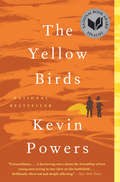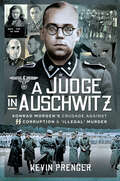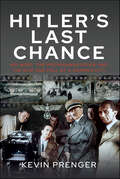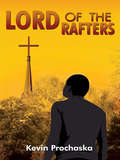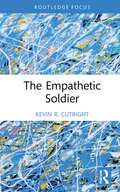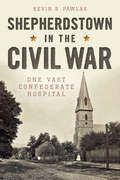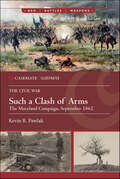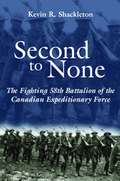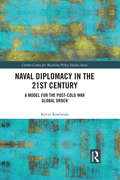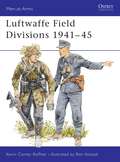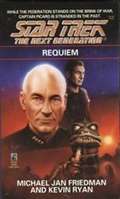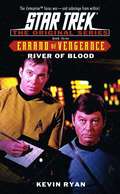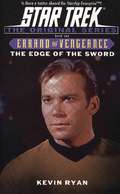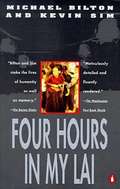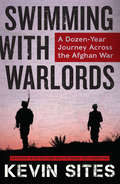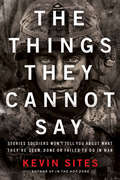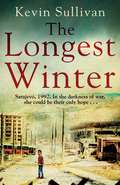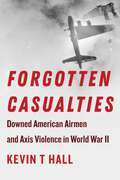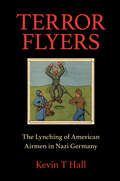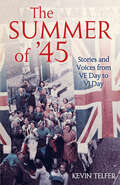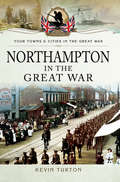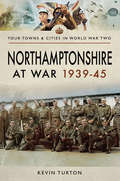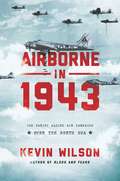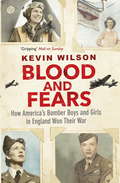- Table View
- List View
The Yellow Birds: A Novel (Litterature & Documents Ser.)
by Kevin Powers<P>A novel written by a veteran of the war in Iraq, The Yellow Birds is the harrowing story of two young soldiers trying to stay alive. <P>"The war tried to kill us in the spring." <P> So begins this powerful account of friendship and loss. In Al Tafar, Iraq, twenty-one-year old Private Bartle and eighteen-year-old Private Murphy cling to life as their platoon launches a bloody battle for the city. Bound together since basic training when Bartle makes a promise to bring Murphy safely home, the two have been dropped into a war neither is prepared for. <P>In the endless days that follow, the two young soldiers do everything to protect each other from the forces that press in on every side: the insurgents, physical fatigue, and the mental stress that comes from constant danger. <P> As reality begins to blur into a hazy nightmare, Murphy becomes increasingly unmoored from the world around him and Bartle takes actions he could never have imagined. <P>With profound emotional insight, especially into the effects of a hidden war on mothers and families at home, The Yellow Birds is a groundbreaking novel that is destined to become a classic.
A Judge in Auschwitz: Konrad Morgen's Crusade Against SS Corruption & 'Illegal' Murder
by Kevin PrengerIn autumn 1943, SS judge Konrad Morgen visited Auschwitz concentration camp to investigate an intercepted parcel containing gold sent from the camp. While there Morgen found the SS camp guards engaged in widespread theft and corruption. Worse, Morgen also discovered that inmates were being killed without authority from the SS leadership. While millions of Jews were being exterminated under the Final Solution programme , Konrad Morgen set about gathering evidence of these ‘illegal murders’. Morgen also visited other camps such as Buchenwald where he had the notorious camp commandant Karl Koch and Ilse, his sadistic spouse, arrested and charged. Found guilty by an SS court, Koch was sentenced to death. Remarkably, the apparently fearless SS judge also tried to prosecute other Nazi criminals including Waffen-SS commanders Oskar Dirlewanger and Hermann Fegelein and Auschwitz Commandant Rudolf Höss. He even claimed to have tried to indict Adolf Eichmann, who was responsible for organising the mass deportation of the Jews to the extermination camps. This intriguing work reveals how the lines between justice and injustice became blurred in the Third Reich. As well as describing the actions of this often contradictory character the author questions Morgen’s motives.
Hitler's Last Chance: Kolberg: The Propaganda Movie and the Rise and Fall of a German City
by Kevin PrengerThe war in Europe was reaching its cataclysmic final months with Germany surrounded on all sides. Hitler’s forces had been driven from Poland by the Red Army and the Soviets were poised a short distance from Berlin, while the Western allies, having repulsed the Führer’s Ardennes offensive, were preparing to cross the Rhine. More than ever, Hitler needed his people to stiffen their resolve for the coming onslaught. To demonstrate what will be expected of the German people, and what they could achieve if they refused to acknowledge defeat, a major feature film would be shown, featuring the one place which held out against Napoleon when he invaded Prussia in 1807 – the city of Kolberg. After crushing the Prussian Army in 1806, French forces swept into the Prussian province of Pomerania. One by one the Prussian fortresses surrendered, mostly without offering any resistance, except for Kolberg. The small and weakly-fortified city held out for four months despite being surrounded by Napoleon’s forces, with Major von Gneisenau organizing a citizen’s militia to aid the Army in its defense. Though much of the city was blasted into ruin, Kolberg remained in Prussian hands until the war with France ended with the signing of the Peace of Tilsit, by which time its defense had become legendary. Even though the Third Reich was literally entering its death-throes, in attempting to reproduce the siege of Kolberg on film, thousands of experts, extras and horses were taken from the war effort by the Reich Minister of Propaganda, Joseph Goebbels. The film’s emphasis was to show how civilians and the military can work together to save Germany – just as Kolberg had been saved from the French. The result has been stated to be the most expensive feature film ever made in Germany. This book examines the dramatic conditions under which the film was produced, and the scale of the resources needed to do so, followed by its first showing on 30 January 1945. All Goebbels' efforts, though, were to no avail, as the film never went on general release. A month later, as the author reveals, Kolberg found itself under siege once again, but this time, after bitter house-to-house fighting, it fell to the Soviets in less than four weeks.
Lord of the Rafters
by Kevin ProchaskaA bitter Mulatto man searches for meaning in his tumultuous existence while struggling to find his relationship to God.
The Empathetic Soldier (War, Conflict and Ethics)
by Kevin R. CutrightThis book shows the contribution that empathy can and should make to the proper conduct of war. US Army doctrine identifies empathy as an essential trait in soldiers; despite this endorsement of senior leaders, empathy’s role in the military profession remains obscure. The notion of soldiers empathetically considering others, especially enemies, strikes many as counter to the nature of soldiering. Additionally, confusion caused by differing definitions of empathy often leads to its complete dismissal. This work clarifies the concept by considering recent philosophical, psychological, and neuroscientific research, and demonstrates the relevance of empathy to the tactical and strategic demands of war. Empathy amplifies soldiers’ understanding of human actors in an operational environment, enables soldiers’ critical and creative thinking, and improves their overall intentions, planning, and assessments of a war’s progress. While empathy can make soldiers more susceptible to the psychic wound of moral injury, it also helps prevent and overcome this injury. Instead of dismissing it, soldiers should assimilate empathy into their moral frameworks. This book will be of much interest to students of the ethics of war, psychology, and military studies generally.
Shepherdstown in the Civil War: One Vast Confederate Hospital (Civil War Series)
by Kevin R. PawlakBecause they were situated near the Mason-Dixon line, Shepherdstown residents witnessed the realities of the Civil War firsthand. Marching armies, sounds of battle and fear of war had arrived on their doorsteps by the summer of 1862. The Maryland Campaign of September 1862 brought thousands of wounded Confederates into the town's homes, churches and warehouses. The story of Shepherdstown's transformation into "one vast hospital" recounts nightmarish scenes of Confederate soldiers under the caring hands of an army of surgeons and civilians. Author Kevin R. Pawlak retraces the horrific accounts of Shepherdstown as a Civil War hospital town.
Such a Clash of Arms: The Maryland Campaign, September 1862 (Casemate Illustrated)
by Kevin R. PawlakA fully illustrated narrative of the Maryland campaign 1862, culminating in Antietam, the bloodiest single day in American military history. By the late summer of 1862, it appeared as though the United States would be permanently split in two, and by the beginning of September, General Robert E. Lee's Army of Northern Virginia was on the doorstep of Washington, D.C. Panicked and defeated Federal soldiers huddled behind the capital’s defenses. Rather than attacking the city, Lee turned his attention north into Maryland, seeking a decisive battlefield victory to influence public opinion at home and diplomatic opinion overseas. Major General George B. McClellan led the reorganized Army of the Potomac into the state to meet Lee. Over a span of 18 days, the two armies fought four significant battles, including the climactic engagement along Antietam Creek outside Sharpsburg on September 17, 1862. The battle there still holds the distinction as the bloodiest single day in American military history. Forced from Maryland, Lee withdrew into Virginia, leaving President Abraham Lincoln free to follow up this strategic victory with the preliminary Emancipation Proclamation, a measure that changed the nature of the American Civil War. Copious illustrations and maps paired with a detailed text, this account of the Maryland campaign will have wide appeal.
Second to None: The Fighting 58th Battalion of the Canadian Expeditionary Force
by Kevin R. ShackletonOne of only fifty infantry battalions to see action with the Canadian Expeditionary Force during World War I, the 58th nevertheless had no official history. Second to None tells the story of this important, yet forgotten, battalion. The soldiers who formed the 58th exemplified the ideal citizen soldiers and later evolved into the tough, battle-savvy veterans who destroyed the cream of the German Imperial Army and won battle honours. The author uses the men’s letters and diaries and family oral histories to amplify the terse account of the 58th’s war diary, bringing to life once more the men who paid the price for freedom.
Naval Diplomacy in 21st Century: A Model for the Post-Cold War Global Order (Corbett Centre for Maritime Policy Studies Series)
by Kevin RowlandsThis book offers a detailed investigation of naval diplomacy, past and present, and challenges the widely accepted Anglo-American school of sea power thought. Despite the acknowledgement of the importance of the threat or use of force in the pursuit of policy since the dawn of strategic thought, the utility of seapower in operations other than war is poorly understood and articulated. Theorists have invariably viewed seapower in peacetime through the lens of hard power effects such as coercion and deterrence. Commentaries on engagement, interoperability and the forging of friendships are largely conspicuous by their absence. This book considers how all these strands of international politics can be better understood for use in the 21st century. The book explains and defines naval diplomacy, with existing theoretical frameworks being critically analysed. It reviews over 500 incidents from the post-Cold War era, drawing on this empirical evidence to determine that naval diplomacy remains a potent means of 21st century statecraft. It finds that existing understanding of naval diplomacy is insufficient and offers an alternative model, drawing on basic communication and stakeholder theories. The implications of the book relate directly to national security: naval deployments could be more effectively targeted; foreign activity at sea could be better understood and, if necessary, countered; finally, the ability of non-state actors to support national interests from the sea could, potentially, be better harnessed. This book will be of much interest to students of naval power, maritime security, strategic studies and International Relations.
Luftwaffe Field Divisions 1941-45
by Ronald Volstad Kevin RuffnerHermann Göring raised the Luftwaffe Field Divisions [LwFD] during 1942, when Nazi Germany was still making spectacular gains but was first feeling the pinch of its losses on the Eastern Front. The Reichsmarschall decided to raise his own divisions for ground service under the command of Luftwaffe officers. On 17 September 1942, Göring called for volunteers from throughout the Luftwaffe for combat duty in the East. Even before that date, however, some Luftwaffe troops were heavily engaged against the enemy in Russia in a ground role. Kevin Conley Ruffner's engaging text tells the fascinating story of the LwFD during World War II.
Requiem: A Novel (Star Trek: The Next Generation #32)
by Michael Jan Friedman Kevin RyanTwenty-five years ago, Captain Jean-Luc Picard conducted breakthrough negotiations with an aggressive race called the Gorn. Now, on the anniversary of that achievement, Captain Picard and the U.S.S. Enterprise are headed for the Gorn Homeworld to continue that important work. But when the ship stops to investigate a mysterious alien artifact, Captain Picard is suddenly hurled through time and space. Just as Commander Riker and the Starship Enterprise crew begin an impossible search for their captain, the Gorn summit goes terribly wrong. As war looms over the galaxy and Picard is desperately needed on the Gorn Homeworld, the captain finds himself stranded in the past on a planet called Cestus III at a crucial turning point in Federation history. Now, caught in a deadly situation that challenges Picard's most cherished beliefs, he must weigh the fate of a world against the future of the entire Federation...
River of Blood: Errand of Vengeance Book Three (Star Trek: Vanguard #Vol. 3)
by Kevin RyanEvery person has a story, and those who are lucky enough to share the voyages of Capt. James T. Kirk aboard the Starship Enterprise have stories unlike anyone else's. Some live, some die, but even those who serve below deck sometimes make all the difference in the universe! The news from Starfleet Command is grim: a full-scale war against the Klingon Empire is coming, a war that the Federation may not be able to win. In anticipation of a monumental conflict, the U.S.S. Enterprise is assigned to guard a vital starbase located perilously close to Klingon space. But even as Kirk's mission brings him into a tense confrontation with an invading Klingon battle cruiser, an equally deadly menace lurks within the ranks of his own crew: Klingon infiltrator agents, posing as Starfleet officers and sworn to destroy the enemies of the Empire -- even at the cost oftheir own honor!
Star Trek: Seeds Of Rage (Star Trek: Vanguard )
by Kevin RyanERRAND OF FURY Following the harrowing events of the Errand of Vengeance trilogy, tensions between the Federation and the Klingon Empire are the highest they've been since the Battle of Donatu V twenty-five years earlier. Even as Federation Ambassador Robert Fox engages in tense negotiations with the Klingon ambassador to maintain the peace, Captain James T. Kirk of the Starship Enterprise sees his vessel refit from a ship of exploration into a ship of war. The coming conflict will take its toll on many personal lives as well... Leslie Parrish: The security supervisor is stunned to learn that she is pregnant by her recently killed lover, Jon Anderson -- and that Anderson was, in fact, a Klingon spy, surgically altered to pass as human. Karel: Brother of the Klingon agent posing as Anderson, and responsible for his death, Captain Koloth's new first officer faces a crisis of faith as he sees the Klingon Empire falling into dishonorable ruin. Michael Fuller: Father of Enterprise security supervisor Sam Fuller, who was killed in a battle with the Klingons, his son's death reminds him of Donatu V, of which he was one of the few survivors. Has Fuller reenlisted in Starfleet and joined the Enterprise security team out of loyalty -- or vengeance? The first in an all-new series! SEEDS OF RAGE
The Edge of the Sword: Errand of Vengeance Book One (Star Trek: The Original Series)
by Kevin RyanA thrilling Star Trek adventure novel featuring Captain Kirk and members of the original crew as they face an unknown phenomenon headed to destroy a planet and its possible origins of a past coming back to haunt them.Lt. Jon Anderson is the newest security officer aboard the U.S.S. Enterprise. He joins the crew at a time of mounting tension between the Federation and the Klingon Empire. Previous battles have been inconclusive, but Starfleet Command fears that the Klingons are gearing up for a major offensive. The Enterprise would be on the front lines of an all-out interstellar war. But Lieutenant Anderson has a secret: he is actually a Klingon infiltrator assigned to sabotage Starfleet from within. His first mission: kill Capt. James T. Kirk.
Four Hours in My Lai
by Kevin Sim Michael BiltonUncovering the secrets behind the 1968 My Lai massacre in Vietnam, this is "a brutal, cautionary tale that serves as a painful reminder of the worst that can happen in war. "--Chicago Tribune.
Swimming with Warlords
by Kevin SitesIn this electrifying first-person account, journalist and author Kevin Sites goes deep into the geopolitical morass of Afghanistan to emerge with critical insights into both a people and a war that few truly comprehend.As a journalist for NBC News, Kevin Sites made his first trip to Afghanistan in October 2001, crossing the Amu Darya River at night, traveling with Northern Alliance fighters as they toppled the Taliban regime with the help of American forces. In that first hundred days, he lost seven colleagues and nearly his own life. Since then, Sites has returned five more times. On his last trip in summer 2013, on the eve of America's planned withdrawal, he retraced the steps of his first original odyssey to examine what, if anything, has changed.Using his trademark immersive style, Sites uncovered surprising stories with unexpected truths. He swam in the Kunduz River with an infamous warlord named Nabi Gechi, who demonstrated his fearsome killing skills as well as a genius for peaceful invention. Sites talked with ex-Taliban fighters, politicians, female cops, farmers, drug addicts, and diplomats, and patrolled with American and Afghan soldiers. In Swimming with Warlords he helps us understand this country of primitive beauty, dark mysteries, and savage violence, as well as the conflict that has cost billions of dollars and thousands of lives--and what we might expect tomorrow and in the years to come.
The Things They Cannot Say: Stories Soldiers Won't Tell You about What They've Seen, Done or Failed to Do in War
by Kevin SitesWhat is it like to kill? What is it like to be under fire? How do you know what's right? What can you never forget? In The Things They Cannot Say, award-winning journalist and author Kevin Sites asks these difficult questions of eleven soldiers and marines, who--by sharing the truth about their wars--display a rare courage that transcends battlefield heroics. For each of these men, many of whom Sites first met while in Afghanistan and Iraq, the truth means something different. One struggles to recover from a head injury he believes has stolen his ability to love; another attempts to make amends for the killing of an innocent man; yet another finds respect for the enemy fighter who tried to kill him. Sites also shares the unsettling narrative of his own failures during war--including his complicity in a murder--and the redemptive powers of storytelling that saved him from a self-destructive downward spiral.
The Longest Winter: What do you do when war tears your world apart?
by Kevin SullivanWhat do you do when war tears your world apart?For fans of The Kite Runner, Girl at War and The Cellist of Sarajevo, The Longest Winter is Kevin Sullivan's inspiring and authentic debut novel about life in Sarajevo during the Bosnian War. Terry is a British doctor on a mission to rescue a sick child in urgent need of life-saving surgery. Brad is an American journalist desperately trying to save his reputation following the disasters of his last posting. Milena is a young woman from Eastern Bosnia who has fled from her home and her husband, seeking refuge from betrayal amid the devastation of besieged Sarajevo. In the aftermath of the assassination of a government minister, three life stories are intertwined in a dramatic quest for redemption.
Forgotten Casualties: Downed American Airmen and Axis Violence in World War II (World War II: The Global, Human, and Ethical Dimension)
by Kevin T HallSheds new light on the mistreatment of downed airmen during World War II and the overall relationship between the air war and state-sponsored violence.Throughout the vast expanse of the Pacific, the remoteness of Southeast Asia, and the rural and urban communities in Nazi-occupied Europe, more than 120,000 American airmen were shot down over enemy territory during World War II, thousands of whom were mistreated and executed. The perpetrators were not just solely fanatical soldiers or Nazi zealots but also ordinary civilians triggered by the death and devastation inflicted by the war. In Forgotten Casualties, author Kevin T Hall examines Axis violence inflicted on downed Allied airmen during this global war.Compared with all other armed conflicts, World War II exhibited the most widespread and ruthless violence committed against airmen. Flyers were deemed guilty because of their association with the Allied air forces, and their fate remained in the hands of their often-hostile captors. Axis citizens angered by the devastation inflicted by the war, along with the regimes’ consent and often encouragement of citizens to take matters into their own hands, resulted in thousands of Allied flyers’ being mistreated and executed by enraged civilians. Written to help advance the relatively limited discourse on the mistreatment against flyers in World War II, Forgotten Casualties is the first book to analyze the Axis violence committed against Allied airmen in a comparative, international perspective. Effectively comparing and contrasting the treatment of POWs in Germany with that of their counterparts in Japan, Hall’s thorough analysis of rarely seen primary and secondary sources sheds new light on the largely overlooked complex relationship among the air war, propaganda, the role of civilians, and state-sponsored terror during the radicalized conflict. Sources include postwar trial testimonies, Missing Air Crew Reports (MACR), Escape and Evasion reports, perpetrators’ explanations and rationalizations for their actions, extensive judicial sources, transcripts of court proceedings, autopsy reports, appeals for clemency, and justifications for verdicts.Drawing heavily on airmen’s personal accounts and the testimonies of both witnesses and perpetrators from the postwar crimes trials, Forgotten Casualties offers a new narrative of this largely overlooked aspect of Axis violence.
Terror Flyers: The Lynching of American Airmen in Nazi Germany
by Kevin T HallTerror Flyers examines the "lynch justice" (Lynchjustiz) committed against American airmen in Nazi Germany during World War II. Using engaging first-person accounts of downed pilots, as well as previously unused primary sources, Terror Flyers challenges the notion that such lynchings were exclusively the domain of Nazi party officials and soldiers. New evidence reveals ordinary German people executed Lynchjustiz as well. Initially occurring as a spontaneous reaction to the devastation of the Allied air campaign against the cities of the Third Reich, Lynchjustiz offered the Nazi regime a unique propaganda opportunity to harness the outrage of the German population. Fueled by inspiration from America's own history of the lynching of African Americans, Nazi propaganda exploited the very same imagery found in US publications to escalate the anger of the German people.Drawing heavily on the accounts of the downed airmen themselves, testimonies from the "flyer trials" held in Dachau during 1945–48, and rarely seen Nazi propaganda, Terror Flyers offers a new narrative of this previously overlooked aspect of the Allied campaign in Europe and suggests that at least 3,000 cases of lynch justice likely occurred between 1943 and 1945.
The Summer of '45: Stories and Voices from VE Day to VJ Day
by Kevin TelferA social history of British civilian life in the months following the declaration of the end of the second world war.On the 8th of May in 1945 British Prime Minister Winston Churchill finally announced to waiting crowds that the Allies had accepted the unconditional surrender of Nazi Germany and that the war in Europe was over. For the next two days, people around the world celebrated. But the “slow outbreak of peace” that gradually dawned across the world in the summer of 1945 was fraught with difficulties and violence.Beginning with the signing of the German surrender to the Western Allies in Reims on 7 May, The Summer of ’45 is a “people’s history” which gathers voices from all levels of society and from all corners of the globe to explore four months that would dictate the order of the world for decades to come.Quoting from generals, world statesmen, infantrymen, prisoners of war, journalists, civilians and neutral onlookers, this book presents the memories of the men and women who danced alongside Princesses Elizabeth and Margaret outside Buckingham Palace on the first night of peace; the reactions of the vanquished and those faced with rebuilding a shattered Europe; the often overlooked story of the “forgotten army” still battling against the Japanese in the East; the election of Clement Attlee’s reforming Labour government; the beginnings of what would become the Iron Curtain; and testimony from the first victims of nuclear warfare in Hiroshima and Nagasaki. Combining archive sources and original interviews with living witnesses, The Summer of ’45 reveals the lingering trauma of the war and the new challenges brought by peacetime.
Northampton in the Great War
by Kevin TurtonWhen war was declared in August 1914, Northampton was swept by a wave of patriotism. Men clamoured to join the ranks and fight in a war they believed would be short lived. There was a sense of excitement, with everyone wanting to do their bit for the country. They believed it was to be a glorious war and thousands, eager to be a part of it, queued outside the recruitment stations to enlist.As that excitement subsided and the town settled into life at war, what really happened in Northampton? How did people react? What did they do and how did it affect their lives? This book describes in meticulous detail exactly what happened in those five years of the Great War and its impact on the town.From the fevered excitement of the early months of war, through to the hope and expectation at its end, this is the story of Northampton's remarkable people and how they helped Belgian refugees who had fled the German invasion, organized fundraising events for the troops and local hospitals, accepted soldiers of the Welsh Fusiliers into their homes and worked long hours producing boots for the army. Against a background of key military events, the book celebrates the huge contribution Northampton and all its people made towards the countrys war effort. It documents a war the like of which no one had ever seen before
Northamptonshire at War, 1939–45 (Your Towns & Cities in World War Two)
by Kevin TurtonWhen the Second World War was declared in September 1939, Northamptonshire was better prepared for the years that followed than it had been twenty-five years earlier. Lessons had been learned from the First World War, and people were far more aware of the impact modern warfare could have on their lives. Through film, press and radio, they were able to monitor the events in Europe in a way unprecedented by any previous generation, which led to a greater understanding of world politics and a realization that the rise to power of Adolf Hitler would have predictable repercussions. So, when Prime Minister Neville Chamberlain addressed the nation after Germanys armies had invaded Poland, war, for many, had already become inevitable.But what exactly did this mean to the people of Northamptonshire, and how did they react to the threat of invasion? What were the consequences of the conflict on the Home Front? How did Northamptonshire's towns and villages function through six years of grinding warfare? These questions, and many others, are examined and answered in the pages of this book.This is the story of those who were there; the people who never accepted the possibility of defeat, who coped with rationing, blackouts, conscription and aerial bombardment, and then welcomed London's evacuees and greeted the American Air Force with open-armed hospitality.Using military events as a background, this book relates Northamptonshire's story, from the parts played in the war effort by the shoe industry, the Northamptonshire Regiment, the Home Guard, the ARP and to, of course, the people.
Airborne in 1943: The Daring Allied Air Campaign Over The North Sea
by Kevin WilsonA gripping account of the heroism of bomber planes in 1943—the year the “Dambusters” embarked on a campaign to try to win World War II in one quick stroke. The year 1943 saw the beginning of an unprecedented bombing campaign against Germany. Over the next twelve months, tens of thousands of aircrews flew across the North Sea to drop bombs on German cities. They were opposed not only by the full force of the Luftwaffe, but by a nightmare of flak, treacherously icy conditions, and constant mechanical malfunction. Most of these courageous crews were either shot down and killed or taken prisoner by an increasingly hostile enemy. This is the story of the everyday heroism of these crews in the days when it was widely believed that the Allies could win the Second World War by air alone. American pilots had a special role in the “Dambusters” campaign in particular. Even before the attacks on Pearl Harbor, scores of eager pilots travelled across the Canadian border to train with other future “Dambusters,” all eager to take part. Authoritative and gripping, Airborne in 1943 brings these remarkable men and women to vivid life.
Blood and Fears: How America's Bomber Boys and Girls in England Won their War
by Kevin WilsonHow America's bomber boys and girls in England won their war, and how their English allies responded to them.In this comprehensive history, Kevin Wilson allows the young men of the US 8th Air Force based in Britain during the Second World War to tell their stories of blood and heroism in their own words. He also reveals the lives of the Women's Army Corps and Red Cross girls who served in England with them. Drawing on first-hand accounts, Wilson brings to life the ebullient Americans' interactions with their British counterparts, and unveils surprising stories of humanity and heartbreak.Thanks to America's bomber boys and girls, life in Britain would never be the same again.
